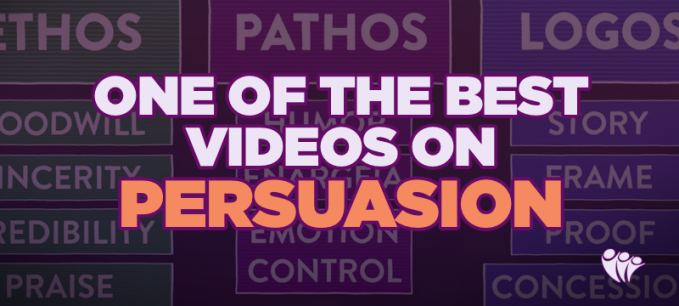One of the Best Videos on Persuasion

This is easily one of the best explainer videos ever made on the subject of persuasion (released June, 2017). I watched it 3 times back-to-back, start to end—and I can't remember the last time I did that for something that’s over 20 minutes.
For facilitators, consultants, and any of our regular newsletter readers who conduct work in the area of communication, sales, conflict, or leadership, I don’t think it’s overblown to say this video contains must-know / must-watch material.
I was especially interested in the part where, at a U.S. senate hearing in 1969, Mr. Rogers was able to win over the “tough guy” (curmudgeonly?) senator. Not only does the senator not cut Mr. Rogers' $20M budget, but he actually sees it increased to $22M.
Like the senator, I got goosebumps.
The video, which is beautifully timed and animated, deconstructs the communication techniques used by Mr. Rogers as part of a larger exploration into the art of rhetoric and the essence of intelligent argument.
As mentioned, it's over 20 minutes, but well worth your time.
Make a cuppa. You’re in for a treat.
Full credit to Will Schoder and Yellow Bear Films.
Timeline notes:
- (0:15) Good luck trying to change someone’s mind with just reasoning/logic.
- (0:25) Hume: emotion > reason.
- (0:40) Hume: reason is the slave of the passions.
- (1:10) Haidt: Gut intuitions precede—and dictate—strategic thinking.
- (1:20) Haidt: the analogy that the rational/logical mind is “the rider” (about 1% in control) while the emotional/intuitive mind is “the elephant” (about 99% in control).
- (1:40) Haidt: The way to persuade people is to speak to their elephant first.
- (2:40) Confucius: rhetoric is about empathy/mutual understanding.
- (3:00) An introduction to Aristotle’s 3 modes of persuasion: ethos (character), pathos (emotion) and logos (logic).
- (3:10) You must adapt the 3 modes to the audience and the situation.
- (3:30) Introduction to ethos.
- (4:10) Aristotle believed that ethos is the most important mode: a person’s life persuades better than their words.
- (4:20) Introduction to pathos.
- (4:40) Humour is the most common appeal to pathos.
- (5:15) Introduction to logos.
- (5:50) “Concession” is the most important logos technique.
- (6:20) Logos can be (theoretically) the strongest mode, but in practice is typically the weakest at the beginning of an argument and must be combined with ethos and pathos to be truly effective before hard facts/proofs will be taken seriously.
- (6:45) Use all 3 modes to get people to like and trust you.
- (7:00) Mr. Rogers — introduction.
- (7:52) Mr. Rogers — use of ethos, pathos, and logos.
- (8:40) Mr. Rogers — importance of demeanour and tone.
- (8:45) Cicero (one of the greatest orators in history) believed the speaker is an emotional role model—setting the emotional tone that he/she wants the audience to feel.
- (13:13) The “enargeia” rhetorical technique.
- (14:00) Mr. Rogers — use of song.
- (16:00) “Argument” vs. “fight.”
- (17:00) Gottman’s famed “love lab” research on married couples.
- (17:25) The successful couples 1) used arguments to solve problems 2) worked out differences and 3) had faith in the outcome.
- (18:00) Arguments are often framed with military language (e.g., enemy, attack, dig in) when they are better framed as a dance.
- (19:30) “The only way for the whole truth to emerge… is by the reconciling and combining of opposites.” — John Stuart Mill, On Liberty
- (19:50) Civil discourse should precede civil disobedience.
- (20:15) “… dictate a man’s judgment, command his action, or mark him to be despised, and he will retreat within himself, close all the avenues to his head and his heart; and even though your cause be naked truth itself, transformed to the heaviest lance, harder than steel, and sharper than steel can be made, and though you throw it with more than Herculean force and precision, you shall be no more be able to pierce him, than to penetrate the hard shell of a tortoise with a rye straw.” — Abraham Lincoln
- (20:54) The best defense against a master persuader is knowing their tools.
- (21:50) If you are truly interested in winning someone over to your point of view, you’ll need to understand the importance of showing respect, warmth, and openness to dialogue.
- (22:00) Praise, humour, sincere interest, and story go along way.
- (22:50) Friendship!
Topics:
Smarter Thinking
Theo Winter
Client Services Manager, Writer & Researcher. Theo is one of the youngest professionals in the world to earn an accreditation in TTI Success Insight's suite of psychometric assessments. For more than a decade, he worked with hundreds of HR, L&D and OD professionals and consultants to improve engagement, performance and emotional intelligence of leaders and their teams. He authored the book "40 Must-Know Business Models for People Leaders."


/Optimising%20the%20Employee%20Lifecycle_%20A%20Strategic%20Approach%20to%20Workforce%20Success.png?width=374&name=Optimising%20the%20Employee%20Lifecycle_%20A%20Strategic%20Approach%20to%20Workforce%20Success.png)
We Would Like to Hear From You (0 Comments)